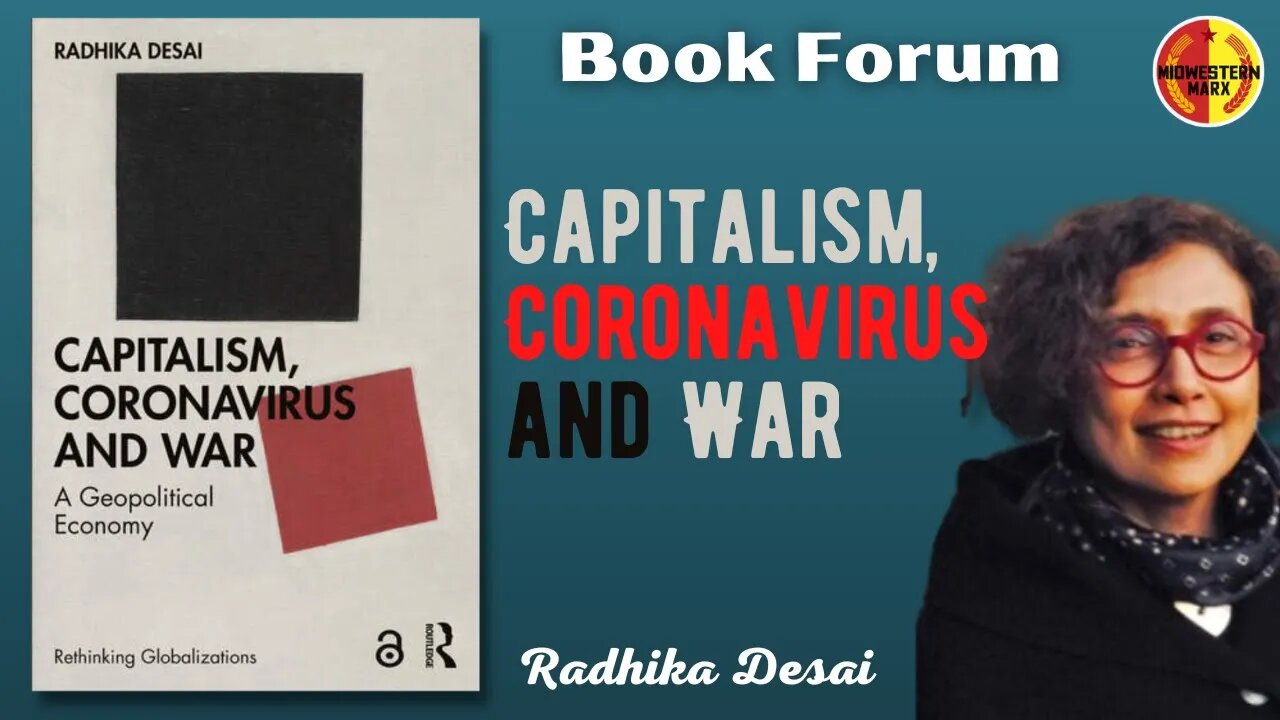Premium Only Content

Book Forum: Radhika Desai | Capitalism, Coronavirus and War: A Geopolitical Economy
The Midwestern Marx Institute Book Forum is a space where authors can present their new books in 30 minute time-slot followed by 30 minutes for audience questions.
In tonight's event, we will be discussing professor Radhika Desai's new book Capitalism, Coronavirus and War, published by Routledge: https://www.routledge.com/Capitalism-Coronavirus-and-War-A-Geopolitical-Economy/Desai/p/book/9781032059501
Author Bio: Dr. Radhika Desai is a Professor at the Department of Political Studies, and Director of the Geopolitical Economy Research Group at University of Manitoba, Winnipeg, Canada. She has proposed a new historical materialist approach to understanding world affairs and geopolitical economy based on the materiality of nations. Some of her recent books include Geopolitical Economy: After US Hegemony, Globalization and Empire (2013), Karl Polanyi and Twenty First Century Capitalism (2020) Revolutions (2020) and Japan’s Secular Stagnation (2022). Her articles and book chapters appear in international scholarly journals and edited volumes. With Alan Freeman, she co-edits the Geopolitical Economy book series with Manchester University Press and the Future of Capitalism book series with Pluto Press. Her latest book is Capitalism, Coronavirus and War: A Geopolitical Economy, which is now available through open access.
Carlos L. Garrido's endorsement of Capitalism, Coronavirus and War:
"Desai’s timely book does a magnificent job at showing how the capitalist West’s catastrophic management of the Covid-19 pandemic, along with its potentially planet-annihilating New Cold War against Russia and China — carried out through a ‘hot’ proxy war in Ukraine, and potentially in Taiwan — are not isolated and accidental events. These are all interconnected and symptomatic of a moribund capitalism, whose contradictions, and their manifestation in the 1970s crisis, drove it into an era of neoliberal financialization which merely prolonged its death sentence. With the emergence of socialist China and pluripolarity, the spectacle of capitalism’s decay is before us, but with it also is the fact that it prefers an apocalyptic end to the end of its hegemony. The question for us will be: can we take advantage of these objectively ripe conditions to organize for socialism? Or will we continue to be haunted by Fukuyama’s proclaimed end of history so much so that we lose sight of the fact that the end of history is itself coming to an end? Desai definitively shows the putrescent condition of capitalism and the genuine potential this provides for those who can imagine a socialist world beyond our current barbaric one."
-
 1:38:51
1:38:51
Midwestern Marx Institute for Marxist Theory & Political Analysis.
1 year agoProfessor Radhika Desai on Israel-Palestine, US Imperialism, Russia, China, and much more!
4264 -
 LIVE
LIVE
StoneMountain64
2 hours ago#1 WARZONE TACTICIAN + New Battlefield Trailer
204 watching -
 20:03
20:03
Adam Does Movies
3 hours agoAlien: Earth Episode 1 - Recrap
47 -
 15:38
15:38
IsaacButterfield
10 hours ago $0.12 earnedExploiting His Baby For Views (The Island Boys)
9388 -
 32:09
32:09
The Boomer Effect
6 hours agoBuy American and Build America
3 -
 1:59:46
1:59:46
The Charlie Kirk Show
3 hours agoShould Taylor Swift Submit? + What's Wrong In Minneapolis? + MAHA vs. CDC | 8.28.2025
43.9K22 -
 50:23
50:23
The White House
2 hours agoPress Secretary Karoline Leavitt Briefs Members of the Media, Aug. 28, 2025
28.7K23 -
 1:01:34
1:01:34
Timcast
4 hours agoCatholics Targeted By TRANS Shooter, Left Blames CHRISTIANITY
154K109 -
 2:09:57
2:09:57
Steven Crowder
6 hours agoTotal Failure: Unpacking The Media's Evil Reaction to the Minneapolis Church Shooting
335K321 -
 2:05:26
2:05:26
Side Scrollers Podcast
4 hours ago4Chan SUES UK Government + Craig Has Mental Illness Fatigue + Knight Rider REBOOT | Side Scrollers
17.7K1